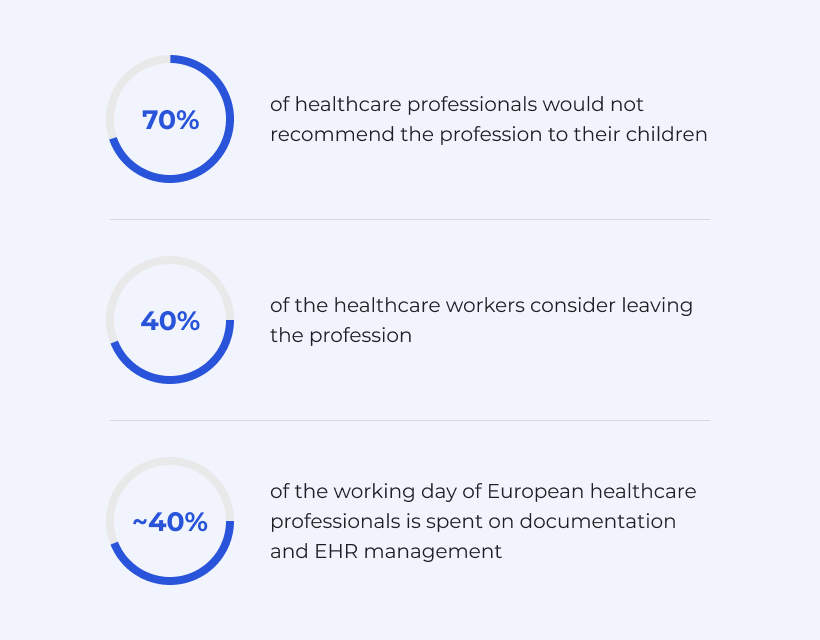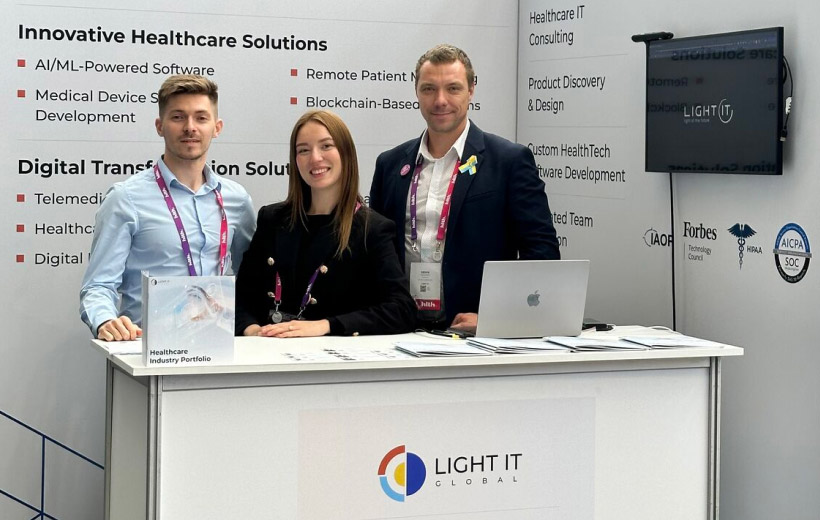On June 17-20 Amsterdam hosted one of the hottest and most influential HealthTech events of the year—HLTH Europe. Surely, Light IT Global couldn’t miss it for the world!
HLTH 2024 brought together leaders, innovators, and stakeholders from across the healthcare domain exploring new horizons in digital health and smart technology. In this article we would like to share insights on the transformative potential of IT in healthcare we’ve gained during this event. Let’s delve into the key takeaways highlighting AI's revolutionary potential in clinical decision-making, the challenges European healthcare founders face, the critical need for employee-centric digital solutions, and more.
AI's Potential to Revolutionise Clinical Decision-Making and Healthcare Workflow
Artificial intelligence has been at the forefront of discussions around healthcare innovation. At HLTH Europe 2024, the spotlight was firmly on AI's ability to transform clinical decision-making processes as well as lift the administrative burden off the HCP’s shoulders. AI-driven diagnostics and predictive analytics are no longer futuristic concepts; they are rapidly becoming integral parts of modern healthcare. Still, there are numerous innovative ways in which Artificial Intelligence can improve healthcare practices even further.

Precise, data-driven insights can lead to more accurate diagnoses, personalized treatment plans, and improved patient outcomes. For instance, AI algorithms can detect early signs of diseases such as cancer or cardiovascular conditions with greater accuracy than traditional methods, enabling timely interventions and potentially saving lives.
Moreover, AI's role extends beyond diagnostics. It is also enhancing clinical workflows by automating routine tasks and allowing healthcare professionals to focus more on patient care. This shift is crucial in addressing the growing demand for healthcare services and the chronic shortage of healthcare workers.
One of the existing drawbacks in AI that was widely discussed during the event is Artificial Intelligence bias elimination. Innovators must ensure that AI tools are developed with diverse data sets to avoid reinforcing existing biases. As Rowland Illing, Chief Medical Officer at AWS, notes, AI should enhance, not hinder, the patient care experience.
Navigating the Complexities of European Healthcare Innovation
While the United States leads in later-stage funding for healthcare startups, European founders face unique challenges in their quest to make a major impact. Despite Europe's significant healthcare spending and superior care quality, the journey from innovation to implementation is often fraught with complexities.
One of the critical challenges discussed at HLTH Europe 2024 is the fragmented nature of the European healthcare market. Each country has its regulatory framework, reimbursement policies, and healthcare delivery models. This diversity can be a double-edged sword for innovators, offering a broad market but requiring tailored strategies for each region.
To navigate these complexities, European founders must engage closely with stakeholders at various levels of the healthcare system. This involves understanding local regulations, building relationships with healthcare providers, and demonstrating the value of their solutions through pilot projects and clinical trials. Collaboration with established companies and regulatory bodies is essential to drive meaningful change and achieve scale.
Addressing the Healthcare Workforce Exodus
One of the most pressing issues highlighted at HLTH Europe 2024 is the exodus of healthcare workers. Statistics shared by speakers were alarming: 70% of healthcare professionals would not recommend the profession to their children, and 40% are considering leaving it. Nearly 40% of their day is spent on documentation and EHR management, leaving little time for patient care.

This situation underscores the urgent need for employee-centric digital solutions that alleviate administrative burdens and enable healthcare professionals to focus on patient care. Innovative technologies such as AI-driven documentation tools, voice recognition software, and custom streamlined EHR systems can significantly reduce the time spent on paperwork, enhancing job satisfaction and retention rates.
Digital health solutions that prioritize the well-being of healthcare workers are not just beneficial for employees but also for patients. When healthcare professionals are less burdened by administrative tasks, they can provide higher quality care, leading to better patient outcomes.
Reducing Disparities in Healthcare
The needs of vulnerable and diverse communities must be at the forefront of any innovation in healthcare. Customized approaches are essential to meet the unique health demands of different population cohorts.
For example, Paula Bellostas Muguerza, Senior Partner and Global Healthcare & Life Sciences Practice Leader at Kearney, highlighted the pervasive challenges and disparities that women face globally. Collaborative initiatives are working to address critical issues in reproductive health, brain health, heart health, autoimmune diseases, and cancer treatment. Improving women's health requires a unified approach that transcends organizational boundaries.

Eliminating the Digital Divide
Technology must address the digital divide between socio-economic groups to enhance health equity. Efforts must be made to provide digital literacy and access to necessary tools for underserved communities. Addressing digital access is key to ensuring that innovations reach and benefit all communities.
Stronger Focus on Personalization and Patient-Centric Case
Improving patient experiences through technology was a recurring theme at HLTH Europe 2024. The event highlighted several innovations aimed at enhancing patient engagement and outcomes.
Telehealth and Wearable Devices
Telehealth and wearable devices are transforming how patients interact with healthcare providers. These technologies enable remote monitoring and consultations, making healthcare more accessible and convenient. Patients can receive care from the comfort of their homes, reducing the need for hospital visits and improving overall satisfaction.
Patient Engagement Platforms
Patient engagement platforms are designed to empower patients with information and tools to manage their health actively. These platforms provide educational resources, appointment scheduling, medication reminders, and more, fostering a proactive approach to health management.
Digital Pathways
Digital pathways adoption can be one of the ways to achieve faster closure of the digital divide and maximum personalization. They can streamline healthcare, freeing up resources for face-to-face interactions for those who need them most. However, healthcare solutions must be adaptable to diverse needs of the patients and the healthcare workers so that the further exacerbation of health inequalities could be prevented.
Collaborative Efforts: A Path to Meaningful Change
The importance of collaboration in driving healthcare innovation cannot be overstated. HLTH Europe 2024 underscored the necessity of partnerships between startups, established companies, and regulatory bodies.
The panel at the event, composed of industry leaders such as Nicolas Castoldi, Micaela Seemann Monteiro, Thomas Whicher, Katherine Jones, and Alexander Casall, emphasized the need to prioritize Product Market Implementation fit. To achieve that the speakers identified key elements for success:
- Measuring KPIs: It is crucial to spend time and communicate with various stakeholders to understand their needs and align KPIs with the hospital's goals.
- Assessing Implementation Effort: Stand-alone solutions are recommended during the pilot phase to minimize the effort required for interoperability.
- Addressing Risk/Reward Ratio: Acknowledging and managing risks associated with new workflows and processes is essential for successful implementation.
Richard Stubbs, Chair at the Health Innovation Network and Chief Executive of Health Innovation Yorkshire & Humber, emphasized the pivotal role of the Health Innovation Network in accelerating healthcare innovation adoption. It can serve as a vital conduit for translating ideas into practical solutions that can be deployed in real-life settings.
Final Words
Such holistic and multifaceted events as HLTH for sure instill confidence that the future of digital health looks promising, with continuous advancements in the medical and technical fields.AI-driven diagnostics, patient engagement platforms, high-performance computing, and other innovations reshape the healthcare landscape and will continue to provide even more opportunities for business growth and patient care improvement. So both innovators and the healthcare market players must stay agile and adaptable to keep up with the fast pace of technological evolution.
For our part, Light IT Global will continue to not only provide you with even more insights from the most influential HealthTech events that take place in different corners of the world but also will continue delivering cutting-edge healthcare solutions that make a difference.



